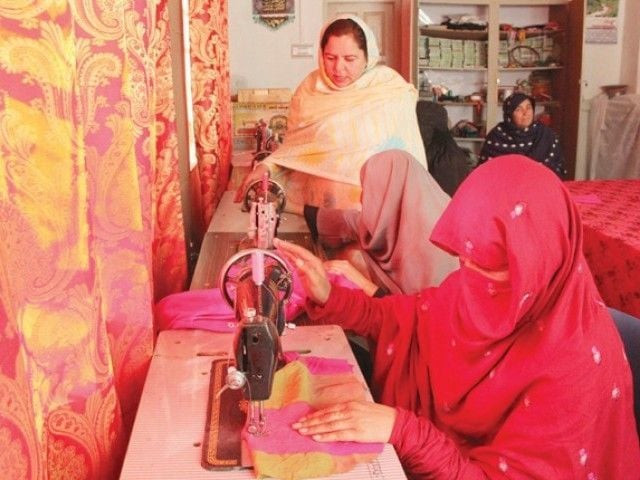Research highlights constraints for working women
Lack of transportation, permission and resuming work after marriage cited as main issues for females

PHOTO: FAZAL KHALIQ/EXPRESS
The research was based on a three-month long survey conducted by Mehreen Khan who visited several industries in Karachi, Lahore, Sialkot and other cities and also interviewed employers and workers to not only find out some answers but also find solutions.
Female staff for a change
To share the experiences of the three-month long research, MDF organised a panel discussion to highlight the constraints and derive the best solutions possible.
Giving an introduction about the work they are doing, Amna Awan from the MDF said that a large number of women work in the leather and pharmaceutical industries. They are being hired because they are better in discipline, punctual and dedicated, she said.
Safeguarding the rights of female workers
Awan said, while giving an overview of the topic, the biggest hurdle women face is lack of transportation, permission from families and issues related to rejoining work after getting married.
The panel discussion has five guests from industry, academia and law.
Talking about the number of females who work in the factories, Shujat Ali, owner of a leather factory in North Nazimabad and member of the Pakistan Leather Garments Manufacturers and Exporter Association, said that when he started his factory 35 years ago, there were 95% female employees but as of today the number has dropped to hardly 10%.The reason for this is our own fault, he said. “We never provided them facilities, a sense of comfort or fulfilled their basic necessities, which is why females started leaving the workplaces,” he explained. He said that another factor that plays an important role is lack of literacy and skills among women.
Female participation in workforce makes sense – at all levels
Ali lamented that in Pakistan, women do not come out to earn or get skilled but earn to support their families. “Women only work when they need to help their husbands or fathers,” he said, adding that even wealthy and educated men do not allow their females to work, despite encouraging them to get higher education.
CEO of Medics Pharma, Muhammad Qayyum said that they have separate timings and workplaces for males and females so that the families of their female employees do not have issues regarding security and workplace harassment. He added that his company has zero tolerance when it comes to harassment. “We have 60% female workers in our company,” said Qayyum.
Home-based workers step out of homes to celebrate working women
A researcher on gender equality in the workplace, Nazish Sheikh, shared her finding that there are a high numbers of females in workplaces at entry levels but the number decreases as the level increases. She suggested that companies need to organise training programmes to sustain the percentage of female employees.
Representing Servis, Qadeer Baseer was of the view that after facilitating females the biggest challenge is to bring back these women to work after marriage or having a child. “We have developed a daycare centre at the factory so that females can easily bring their children with them,” he added.












1724319076-0/Untitled-design-(5)1724319076-0-208x130.webp)






COMMENTS
Comments are moderated and generally will be posted if they are on-topic and not abusive.
For more information, please see our Comments FAQ